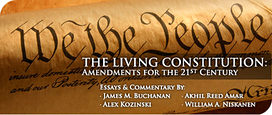A quick rejoinder to Dr. Niskanen: I am not sure why we should focus only on “presidents directly elected from the Senate.” In my book, (p. 415) I present rather different data, to wit:
While before enactment of the amendment only three of the ten most recent presidents had previously served in the Senate (as either a senator or a vice president), after enactment seven of the next ten presidents would be Senate veterans. An even more dramatic shift appears if we focus only on actual senators who were later elected president—a category that describes only one of the ten men most recently elected to the White House before the ratification of the Seventeenth Amendment, but that encompasses five of the next ten elected presidents.[1] Similarly, while ex-senators accounted for only two of the ten most immediate pre-amendment vice presidents, they would account for six of the next ten. Interestingly enough, since 1944 every Democratic Party Convention save one has named a current or former senator as its vice presidential nominee.
I also explain that, although former Senators were in fact important in presidential contests prior to the Civil War, the pattern changed somewhat after the Civil War. Niskanen mentions the antebellum figures of Clay, Calhoun, Webster, and Calhoun, whereas I concentrate on those who actually won the Presidency, as follows (pp. 414-15):
The Seventeenth Amendment probably did enhance the presidential prospects of senators by sharpening their populist electoral skills, public visibility, and perceived electability. In the early republic, the Senate was a notable nursery for future presidents. After Washington (who of course as the first president had no opportunity for a prior job under the new Constitution), eleven of the next fourteen presidents had served in the Senate, either as a senator or as the Senate’s presiding officer (i.e., the vice president of the United States) or both. But the Civil War marked the start of a new, middle-republic pattern, in which popularly elected governors tended to outshine legislatively chosen senators as successful presidential candidates. After Grant’s departure, five of the next nine presidents were big-state governors—two Ohioans, two New Yorkers, and a New Jerseyan.[2]
Then came the Direct Senate Election Amendment. By strengthening the populist credentials of senators, the amendment helped restore members of the upper chamber to their early preeminence (alongside generals and diplomats) as presidential prospects. This change was nicely visible in the two presidential elections that immediately followed the Seventeenth’s enactment. The first, exemplifying the middle-republic model, featured two big-state ex-governors, Woodrow Wilson and Charles Evans Hughes. In the second, in 1920, Ohio’s sitting governor, James Cox ran against one of that state’s sitting senators, Warren G. Harding. As a member of the Senate class of 1915, Harding was in the very first set of men to reach the Senate the ‘clean’ way under the new, Seventeenth Amendment regime. Six years later, the presidency was his.
As for states’ rights, I think that “restor[ing] the role of the states in the routine decisions of the federal government” is connected to states’ rights.
Notes
[1] Of the ten presidents from Grant through Wilson, only Arthur (as VP), Harrison, and TR (as VP) had served in the Senate. (As previously noted, Garfield was tapped for the Senate but did not serve.) Of the next ten presidents—Harding through For—dall but Hoover, FDR, and Eisenhower had Senate experience (Coolidge and Ford only as VPs). If we focus only on elected presidents, Arthur and Ford drop out of the analysis, making Lincoln the first elected president in the tally and Carter the last.
For other recent efforts to measure traffic on the road between the Senate and the White House, see Robert L. Peabody et. al, “United States Senate”; David R. Mayhew, America’s Congress (2000), 153-57; Barry C. Burden, “United States Senators as Presidential Candidates,” Poli. Sci. Qtly. 117 (2002): 81.
[2] Between Washington and Lincoln, the only presidents who spent no time in the Senate were Madison, Polk, and Taylor. Between Grant and Harding, the only presidents who spent no time in governorships were Garfield, Arthur, Harrison, and Taft. Note also that from 1804 through 1860, “all but five of the twenty-four major party [presidential] nominees (excluding the renomination of incumbent presidents) had had some prior service in the United States Senate.” Ibid., 241.

